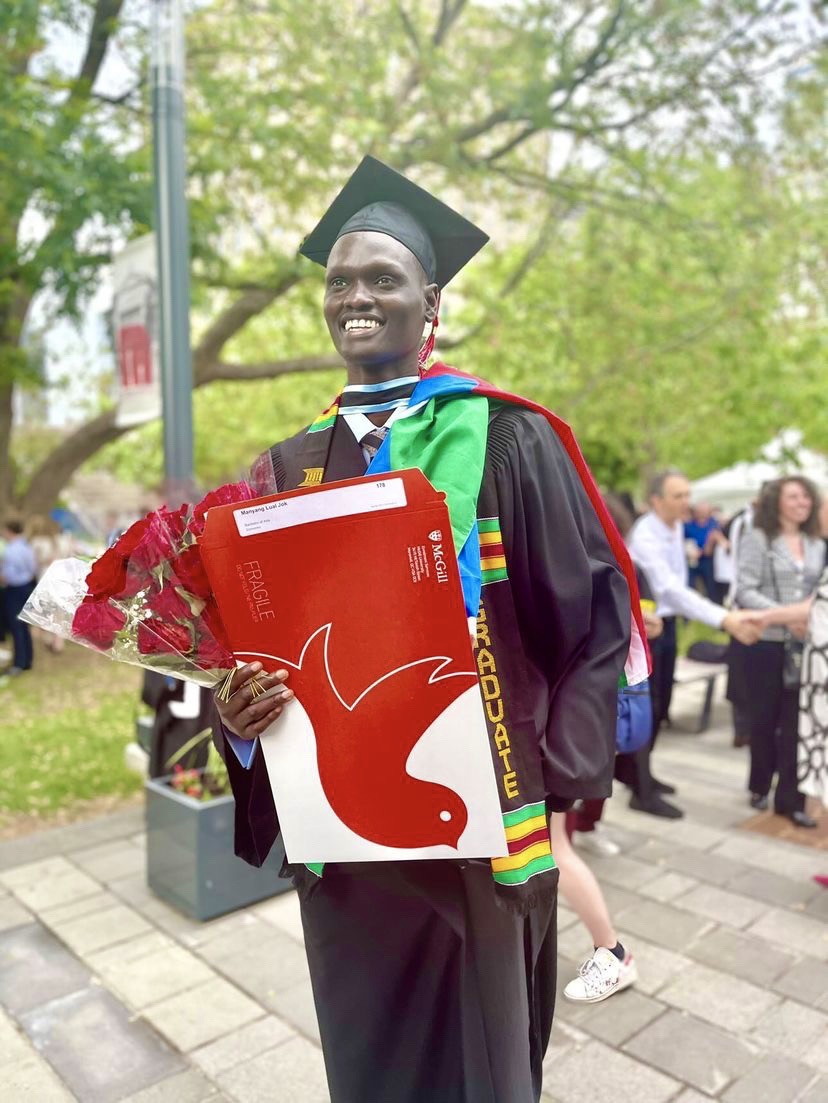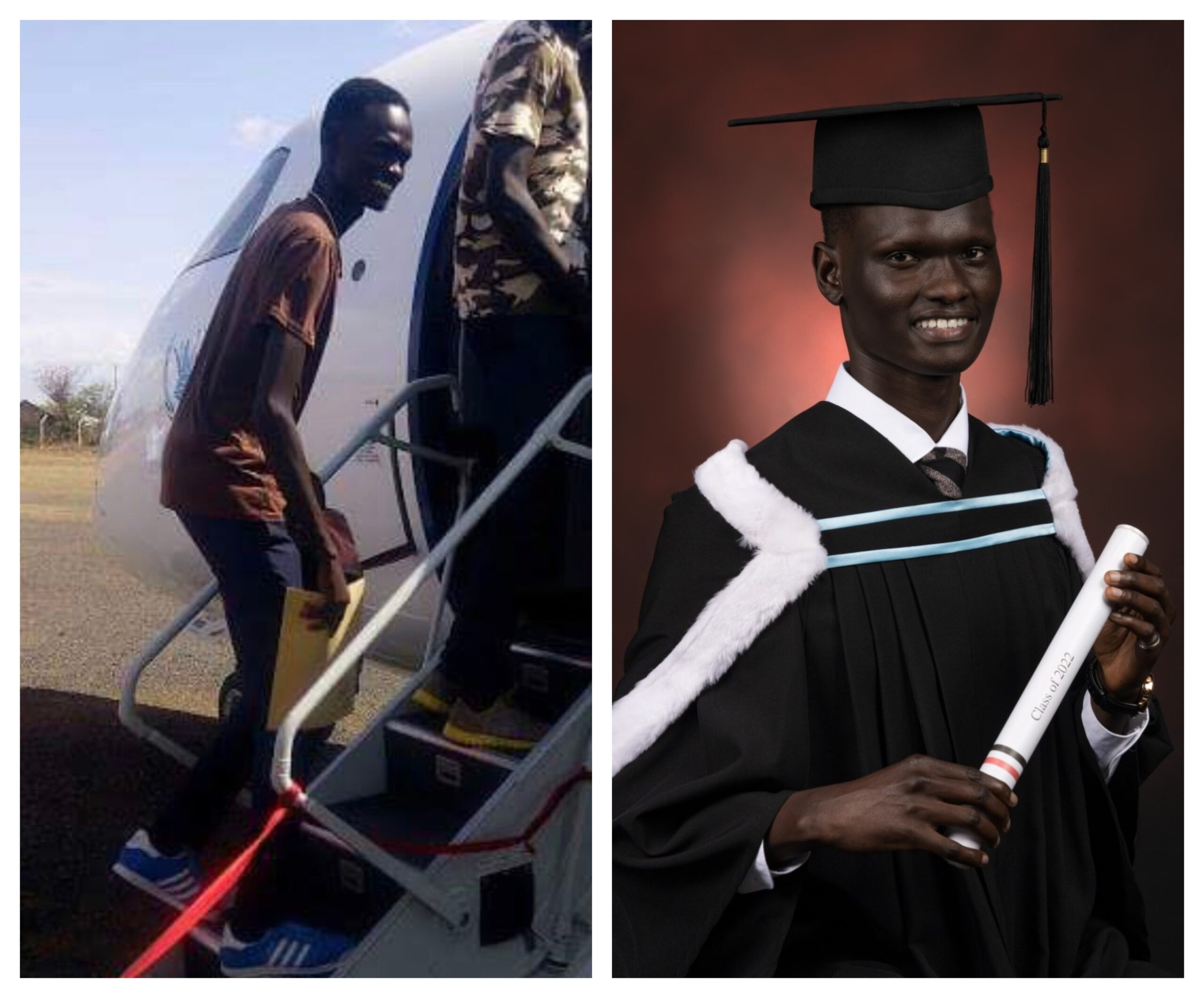A lot of people have a “If you had told me five years ago that I’d be here doing this…” story. But very few can compare to Manyang Lual Jok’s incredible tale.
Just five years ago, he was one of 180,000 of refugees living in the Kakuma Refugee Camp in Kenya. Flash forward to this past Monday, May 30, when a beaming Jok strode across the stage during McGill’s Spring 2022 Convocation to collect his BA in Computer Science and Economics.
A native of South Sudan, Jok fled his war-torn country homeland when he was just nine years old. He and his uncles were placed in the Kakuma camp in northern Kenya, where Jok lived from 2005 – 2017. “Conditions in the camp were really tough,” says Jok. “We relied on the United Nations and other refugee agencies to provide our food every month, but it was barely enough. But because I was so young and had limited access to the internet or television, I grew up thinking that this was just how the whole world lived.”
Working toward a better life

A talented student with a desire to learn, Jok was often frustrated at the situation in the camp. “Just having access to basic education was a challenge,” he says.
But Jok prevailed. Completing both his elementary and high school education at the camp, he heard about the Student Refugee Program (SRP) offered by the non-profit World University Service of Canada (WUSC). Established in 1978, the SRP is a refugee resettlement program that focusses on financial sponsorship and integration for academically-gifted students fleeing war or persecution in developing countries.
Jok was one of over 200 students from the Kakuma refugee camp who applied to the WUSC program. The process took six months and because of limited internet access, Jok and the other applicants from the camp were unable to check the progress of their respective applications.
When the final cut was made, printouts of the names of the 20 people who had been selected to attend a Canadian university was distributed around the camp. Jok was playing basketball with friends when someone came over with one of the printouts.
“I was too nervous to read, so I asked a friend if I had made it. He said that my name was second on the list. It was one of the most exciting moments of my life,” says Jok, breaking into a smile. “For so long I had been looking for a way to better my life.”
“When I googled McGill and realized I had been accepted to one of the best schools in Canada it just doubled my excitement,” he says.
Alone in a new world
In the fall of 2017, Jok took the huge leap, boarding his first plane, relocating to Canada and beginning his Arts degree at McGill. It was a bittersweet moment, as starting his new life meant leaving family and friends behind. “These are people I lived with my whole life,” he says. “It was difficult, but they were so happy that I had been given the opportunity to further my education.”
When Jok stepped off the plane at Trudeau International Airport, he was a 22-year-old in a new country without a single friend. “It was scary,” he admits.
But that would quickly change.
He was met at the airport by students who were part of WUSC McGill. “They were very first people I met in Canada and they were also some of the nicest people I’ve ever met,” says Jok.
Similar experiences

The process of integrating into the University community and navigating the challenges that McGill students face, was greatly facilitated by these new-found friends and allies. “Some of them had had similar experiences to me and they had a better understanding of how to begin life as a student in Canada.”
Jok was given practical advice on life on and off campus – the best courses to take as a first-year Arts undergraduate, how to balance school with a social life, and the practicalities of living alone for the very first time. “There was a lot for me to learn,” says Jok.
He also benefitted from various McGill units, including the Financial Aid Office (“I had huge support from them”). Taking advantage of many of the free services offered by McGill, Jok took French classes to better integrate into Quebec society.
Inevitably, the question of his first Canadian winter crops up. Once again, Jok’s face lights up. “Honestly, the first few days was very fun because I had never experienced winter before,” he says. “Every time it snowed, I would put on my jacket and gloves and go outside.
“But then, after a while, the snow just kept stacking up and I was like ‘Oh, so this is how it’s going to be? I want to go home,’” he says laughing.
Model student
As if doing a double major in computer science and economics isn’t enough, Jok also has an interesting side gig.
One day at a local mall, the 6’4” Jok was approached by someone from Dulcedo Management who said he had potential in the industry.
After meeting with representatives from Dulcedo, Jok signed on in early 2020. Almost immediately, of course, COVID shut down most activities, including Jok’s burgeoning modelling career.
Now that things are picking up again, Jok is looking forward to seeing where this will take him. “When I’m modelling, I feel like I’m being celebrated. That’s something I haven’t felt in a long time,” he says.
Giving back
Not surprisingly, Jok himself became very involved with the McGill WUSC committee, including serving on its executive. When new students would arrive at the airport, Jok was one of the people there to greet them and make them feel at home. He remembers what it feels like to be alone and a little insecure.
“It’s such a humbling experience [meeting new-comers at the airport],” he says. “It brings me back to my first day in Canada – which is one of those memories that I will always hold dear.”
“WUSC is so important and I wish more people at McGill and across Canada would know of it,” he says. “Some of the WUSC alumni are doing incredible things now – often back home,” continues Jok. “These are people who, without the support from this program, would probably be stuck in a refugee camp for the rest of their lives.”
“It takes so little effort to support WUSC, but it really changes people’s lives. And it’s not just individuals, it’s whole families and communities,” he says.
“In 2022, McGill has pledged to support two refugee students from Afghanistan. This is a very great initiative by McGill that I hope will continue every year,” says Jok.
He also urges McGill students to continue to vote Yes on the referendum for the fee levy. “This fee levy which is $4 help WUSC to sponsor and support refuge students every year. McGill students can also learn more about WUSC McGill and what we do. They can also become members of the club and meet other inspirational students.”
The big moment
On May 30, Jok walked across the Convocation stage, marking the end of this leg of his incredible journey. “Being on the stage was an amazing experience,” he says. “It made me feel important and celebrated and it was a nice reminder that the countless hours in the library finally paid off.
While his family couldn’t attend the ceremony in person, they watched the whole three-hour livestream “just to see a glimpse of me getting my degree,” he says.
The interview ends with the question; If, while you were living in the Kakuma Refugee Camp, someone would have told you how your life would change so drastically, what would you have said?
“I would probably not have believed them. Not because I wasn’t capable of graduating from a world-class university or getting signed as a model, but because that part of the world where everything is possible wasn’t open to me,” says Jok. “Thanks to WUSC and McGill my world changed.”
Not that long ago, Jok struggled to envision a future for himself outside the refugee camp. Today he is like so many McGill graduates, interviewing for jobs and planning the rest of his life. A life, seemingly, with no bounds.
Learn more about WUSC McGill and how you can help support its initiatives.

Wonderful story! Congratulations Manyang!
Beautiful story, Neale! Best of luck in the future, Manyang.
The whole WUSC McGill team is beaming with pride for your moment, Manyang. Thank you for being an inspiration, being present to give back to all the WUSC students who came after you and for simply shining so bright!! Congratulations!!
Hello my sister
I would like to talk to you
Refugee from nyarugusu camp in Tanzania interested in applying WUSC-SRP , and you’re one who likes inspiring wusc students and sharing with some experience about Canada
Congratulations Davi, it wasn’t easy and finally you are here😍
Wow, this is very inspiring! The best of luck in this new chapter of your life Manyang.
Congratulations Manyang! I met you when you first arrived and your story has touched me. Well done and best of luck for all your future endeavours!
Congratulations Davi, your insatiable appetite to Learn speaks volumes about you. Go and get it bro
Congratulations 🎊 molen!Lual manyang Jok aka Lual Achol Garangakourial
Congratulations it has been a journey 🙏🏾
Congratulations Nephew and Thanks to McGill and WUSC program!
Finally, the journey of a mere refugee child is inspiring. Its heart-touching and youngsters with the same determination would look on you for such an incredible achievement.
Being in a refugee camp wasn’t susceptible, however, faith and hope kept us pushing, now here you’re being celebrated. I was your junior on the basketball 🏀 team at Hong Kong Court. Can’t forget the cheerful moments we had as a team back in 2017 before you took off. Once again congratulations 🎆
What an awesome story! Congrats
Great insight story! Congratulations nephew Manyang for your great achievement wen nyankaai. Stay blessed always and all the best for your future ahead👏👏👏👏🙏🙏🙏
Congratulations to him
Congratulations
I was in the front row of the platform party when you received your degree. Your smile was so bright, I just knew you were someone special. Congratulations! You are an inspiration to so many. I will be sharing your story for years to come.
Congratulations Manyang.
Congratulations to you. It has been an inspiring life story with a lot of struggles and exciting moments.
actually I have a dream pls I really need a help to come to canada
Wow what an incredible journey 🙏🙏🙏I am one of the beneficiaries of wusc too…I was placed in McGill…. looking forward to meeting u…. thanks for the inspiration… indeed it is a great university
Congratulations!!! Manyang. Your life story to now has been wonderful and dramatic. Wish you all the very best in your future endeavors.
Greatand inspirational story. Best of luck in ur endeavours manyang. Thanks to WUSC team
Congratulations hardwork pays